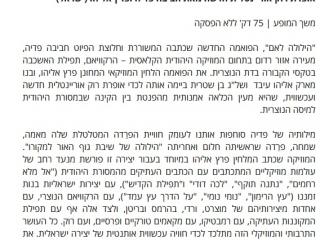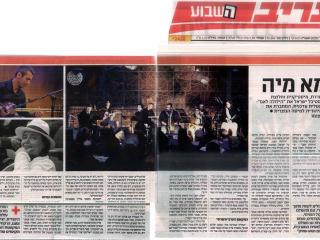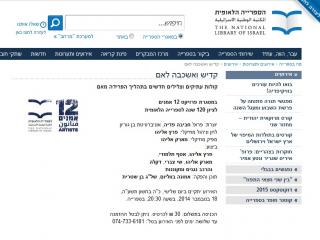The Euro-Mediterranean Institute for Inter-Civilization Dialog (EMID) proposes to promote cultural and religious dialogue between Mediterranean civilisations ; to establish a network of specialists in inter-Mediterranean dialogue ; to encourage Euro-Mediterranean creativity ; to encourage exchange between Mediterranean societies ; to work to achieve Mediterranean conviviality ; to advise charitable organisations working around the Mediterranean and provide the support necessary to achieve their original projects.
Hillula (Celebration) For the Mother
I do not walk in Jerusalem, I am walking you motherKaddish, Chaviva Pedaya, translated by Sandra Alcosser
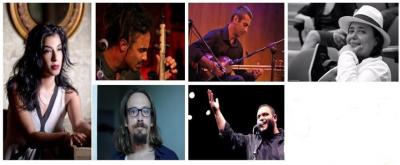
Description
Vision
To conserve – in Israel - the eastern traditions (Orient, North Africa) and to derive content as well as musical shows in Israel's periphery and International stages
To implement t music as a bridge between different groups in Israel and between Jews and Arabs worldwide. This Memorial Festivity (Hillula) takes the form of an Oriental Jewish Rock-opera-come-wake celebration.
This Work comes to revive a space in Jewish classical music, the requiem. It is a passionate Requiem to the Mother. The words of Pedaya portray a journey from the dream of the mother's death to her passing, the ritual garment tearing, the tears, burial, and the rise of the soul. The voyage is colored by the tempest of the soul's ascension, the celebration (Hillula) of returning the body of light to its source.
Activity
In the Mediterranean basin one can still find the unique phenomenon of the last professional mourners ('Mekonenot'),
The project combines Arab Maqam and traditional Andalusian music alongside the Rock Music and the world of Liturgical Piuyt and the Synagogue.
An ensemble of artists, poets and liturgical performances combining traditional sounds and modern art come together to bring the ever present need for a requiem, a celebration, a departing and internalizing of the departed Mother.
This Oriental Rock Opera is unique in the research of Mekonenot done by Haviva Pedaya and the incorporation of real Mekonenot into the fabric of the performance.
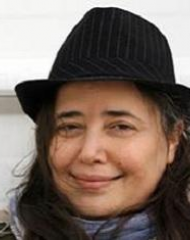
Biography
Haviva Pedaya, Academic Scholar, Poet, Author and Cultural Critic, was born in Jerusalem in 1965 to a family of rabbis and kabbalists and lives in Beersheba. She studied at the Hebrew University and the School of Visual Arts in Jerusalem. Pedaya is at present professor of Jewish history at Ben-Gurion University of the Negev, and head of the Elyachar Center for Sephardi Heritage. She has published articles on religion, sociology, art, history, and mysticism as well as three full-length studies and three volumes of poetry. She is also involved in musical and artistic projects, and founded the Yonah Ensemble which has succeeded in revitalizing liturgical and mystical music of the Near East. Pedaya has won many awards, among them the Harry Harshon Award, the Warburg Prize, the Bernstein Prize for Poetry (1997) and the President`s Prize for Poetry (2004).


